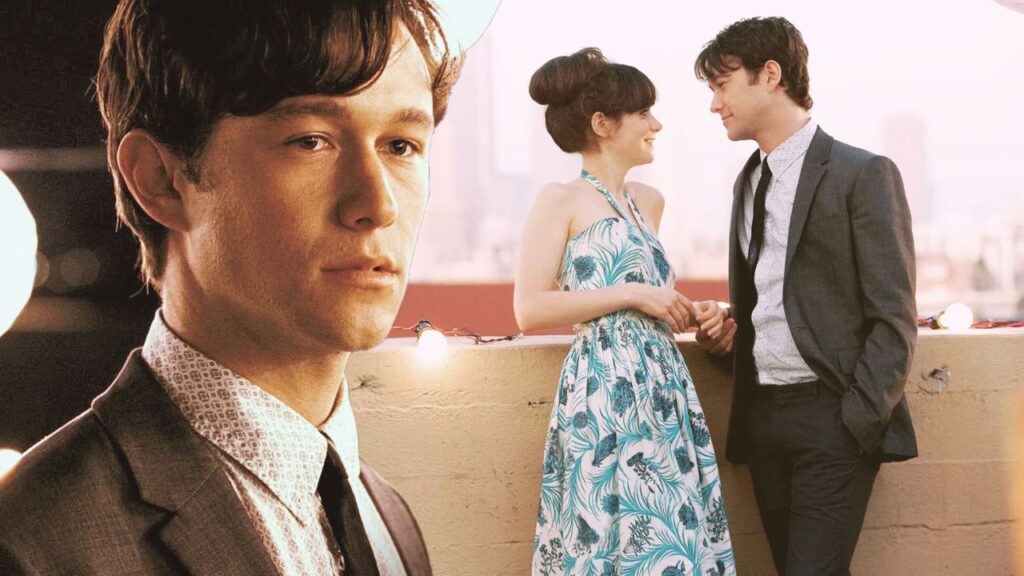This post includes a brief plot summary, an analysis, and an explanation about the ending of the film 500 Days of Summer (2009). Beware of spoilers.
Imagine a love story that unfolds like a puzzle, with pieces scattered across 500 days of joy, heartache, and self-discovery. Marc Webb is the director of this tale, and Joseph Gordon-Levitt and Zooey Deschanel were the chosen actors to bring Tom Hansen and Summer Finn to life.
“500 Days of Summer” is a romantic comedy-drama that challenges viewers to rethink the traditional narrative of romance and embrace the beauty of imperfection.
The story of “500 Days of Summer” follows a non-linear narrative, alternating between past and present moments between Tom and Summer for 500 days.
Tom Hansen is a trained architect who failed to pursue his dreams. At the moment, he is working as a writer for a greeting card company to pay the bills. This is where Tom meets Summer Finn, his boss’s new assistant.
Being the romantic that he is, Tom cannot help but fall in love with Summer. Although she is receptive to his advances, she doesn’t want to commit. This later becomes a point of tension in their relationship because, while Tom wants to label their relationship, Summer doesn’t.
After watching “The Graduate” and going for pancakes later, Summer breaks up with Tom. The abrupt ending of their fling leaves Tom desolated and he sinks into depression. A couple of months passed, and Tom and Summer met up again on a train ride.
At their co-worker’s wedding, Summer and Tom are “cordial”. They see each other again at Summer’s house party. The invitation really brought high hopes for Tom, he thinks Summer wants to rekindle their relationship, but it’s quite the opposite. Summer’s boyfriend proposed, and she said yes, which led Tom to sink into depression again.
Tom quits his job and puts all his energy into his true passion, architecture. Therefore, he assembles a portfolio and starts applying for job interviews. During a random walk, Tom sees Summer sitting at his favourite spot, a bench that overlooks the city.
At this point, Tom is itching to know why Summer chose her husband instead of him. And her answer was rather simple: she just felt it was right. Summer’s response wasn’t pleasing to hear, but she encourages Tom to keep believing that true love exists, despite everything. Then, the two parted ways, wishing each other happiness.
The ending hints that Tom is about to meet a new love interest. While waiting for a job interview, Tom meets a girl who catches his attention. They are applying for the same job and share a lot of common interests. Tom invites the girl for coffee, but she declines. But then she changes her mind, when Tom asks her name, she replies: “Autumn”.
Tom Hansen is an unreliable narrator, meaning that Summer Finn is not the “villain” of this story.
Throughout the film, Tom Hansen has a hard time understanding why Summer Finn dumped him. So, Tom tries to make Summer look like the “bad guy”, when in reality, he is the one in the wrong. Why? Because Tom tried to forge something that was never there.
Summer Finn is not a “puzzle”. As a matter of fact, she is a pretty good communicator. Since the very beginning, Summer has told Tom that she does not want anything serious. She wanted to keep things casual. However, Tom didn’t want to listen. Why? Because the boy was crazy in love!
Tom is an architect and likes to build things in his mind. Ironically, he built an imaginary relationship with Summer that didn’t exist. In addition, Tom only retained the good moments in his head. That’s why he was so heartbroken by the breakup. In his mind, their relationship was perfect, therefore, why would Summer break up with him?
The truth is, Summer Finn never saw Tom Hansen as a true romantic partner. She wanted to keep things casual for that same reason. Summer is not indifferent to Tom, she likes him, but she doesn’t love him. However, Tom refused to accept that their romance wasn’t going anywhere.

“500 Days of Summer” is very good at calling out certain obsessive behaviours that one might mistake for love.
What Tom feels for Summer is not love, it’s some type of blind devotion, which then later turns into “hatred”. During the early days of their relationship, Tom thought Summer was out of his league. When his “dream girl” finally gave him a shot, he panicked and tried to own her.
Until the very end, Tom firmly believes that Summer dumped him for no reason. However, as mentioned before, that’s not Summer’s fault, because Tom failed to acknowledge the signs of a “dying relationship”.
To put it simply, Tom was in love with the idea of “being in love”. He was deeply immersed in his personal fantasy (a perfect relationship) and chose to ignore the signs that things weren’t so good between him and Summer.
Tom’s obsession with Summer is quite severe. Since he couldn’t stop thinking about his “ex”, that also prevented Tom from finding new people to love or build a connection with. A fine example of this would be his date with Allison, where he kept yapping about Summer instead of trying to know the woman in front of him.
Our protagonist never named a specific reason why Summer is the “one”, he just set it in his mind, and that was it. And that is a very toxic way of thinking. No wonder Tom believes every romantic encounter will always be subpar when compared to Summer…
The party at Summer’s apartment really gives the audience a good glimpse of how expectations and reality differ.
Summer didn’t intentionally lead Tom on when she invited him to the party. She likes Tom, as a friend, that’s why she asked him to come. It’s not really her fault that Tom still has feelings for her. Dancing and chatting with an “ex” means being cordial in the adult world. Tom complicated his life by adding meaning to his interactions with Summer.
Tom and Summer have different views on love. They represent opposite sides of the spectrum, and neither of them is wrong. Everyone has a different opinion about love and that’s okay.
The interpretation of the ending scene of “The Graduate” is a fine example of how different Summer and Tom are. This is how Summer sees the ending of the film: full of uncertainty, they are not happy. However, Tom interprets the same ending in a completely different way: they are together, hence, it’s a happily ever after.
While Summer has always been very honest about never “being in love”, Tom has been lying to himself quite a lot. Since he is a true romantic, Tom believes that “true love” changes everything. And as mentioned before, Tom Hansen truly believed that Summer Finn was the “one”. That’s why it crushed him to see her becoming someone else’s “wife”.
“500 Days of Summer” concludes with a bittersweet ending for Tom, as he struggles to accept that he wasn’t the “one” for Summer.
Why did Summer marry the other guy? At the park bench, Summer said she felt that her husband was the one, something she didn’t feel with Tom. Ouch. However, it happens. Just because someone loves you deeply doesn’t mean that you have to reciprocate it. Yes, Tom loved Summer, but that doesn’t mean he owns her love.
In the end, Tom wishes that Summer is truly happy, which might come with a double meaning. First, he really hopes that she’s happy with her husband. Second, he hopes that she doesn’t make the same mistakes as him, such as tricking herself into believing that her current significant other is the one.
Final Thoughts
Without a doubt, “500 Days of Summer” is one of the realest films out there about romantic relationships. The film is a very accurate portrayal of how our expectations about love might be very different from reality. In the end, what is love? And how do we know we have found “the one”?
Overall, “500 Days of Summer” is an incredibly enjoyable film to watch. One of the very few romantic comedies out there that actually teaches viewers something useful. What is the main message of “500 Days of Summer”? Love is not always a fairy tale, and it’s important to adjust expectations (make them realistic) in relationships. Otherwise, we’ll end up like Tom Hansen.



